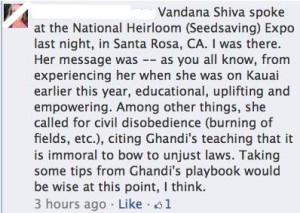A few weeks ago at the Kaneohe Neighborhood Board meeting, I had the chance to talk in person to Representative Wooley. She mentioned that we can contact her as to what laws she’d like us to consider for the upcoming session. I decided to take her up on it and sent her this email tonight. If you’d like to share a word or two with her you can contact her at repwooley@gmail.com or repwooley@capitol.hawaii.gov
Aloha Rep. Wooley,
I spoke with you the other night at the Kaneohe Neighborhood Board meeting and would like to take you up on the offer as far as what kind of legislation I’d like to see regarding agriculture in Hawaii.As a daughter of a long time farmer and farming family for nearly 4 decades, I really think that as a leader, Hawaii needs to consider the bigger picture. Your statement to me that we need to change the meaning of agriculture is very disturbing because for Hawaii. It is not only food that needs to be grown here. We have many other thriving industries here from seeds to nursery plants and other non-food crops that would not fall under your umbrella definition. If we want to grow more food, just going after the seed industry isn’t going to solve the problem. As a leader, I would hope that you could see that. That is a very linear way of looking at the problem which ultimately never solves anything.If the goal is to grow more food in Hawaii, we have to look at all the issues that affect why we aren’t more self sufficient. Look at the whole system to address the best way to reach the intended goal. When you look at those issues like energy costs, labor, supplies, land issues, and the other factors, you can have a better view of a more holistic plan of solving this issue. The problem has to be solved systemically. Your simple solution of changing the meaning of agriculture to growing of food and asking for label for biotech food does nothing to make food more likely to be grown in Hawaii. It places a line between farmers and that is not what is needed. As a leader for the agriculture committee, how can you best serve the farmers, not just a certain faction of them but all farmers?Does siding with one kind of farmer do anyone any favors? No, it doesn’t. You as a leader need to band together all farmers to solve these problems. That is the responsible thing to do. Where does the research and evidence lead to? That should be your guide through all of this.I must also note that your broad statement that there is no regulation about GMOs is patently false. If that were the case, why is it taking such a long time to get through the process to be approved? I’d really appreciate it if you’d be more honest when talking about the issues. You know darn well that there is many tests that have to be presented before anything is approved by the FDA, EPA, and USDA. You may not be happy with the process, but don’t state outright lies about the issue.I’m counting on you, as well as many the younger generation of farmers, who are hesitant on whether or not to continue family farms in this current environment. They need to know if you are really going to be a proponent of agriculture and education and plan to secure the future of ag technologies in Hawaii since you stated that there will be an education campaign. It may not make you popular to your activists but do the responsible thing for the real people who work and support agriculture in Hawaii.
Related articles
- A Farmer’s Say Doesn’t Matter in Hawaii (hawaiifarmersdaughter.com)
- Jessica Wooley Wants to Redefine Agriculture Rather Sink Farmers (hawaiifarmersdaughter.com)
- Hawaii SEED Wants to Destroy Papaya Farmers (hawaiifarmersdaughter.com)
- The Real Problem is not the Anti-GMO Club (hawaiifarmersdaughter.com)





























